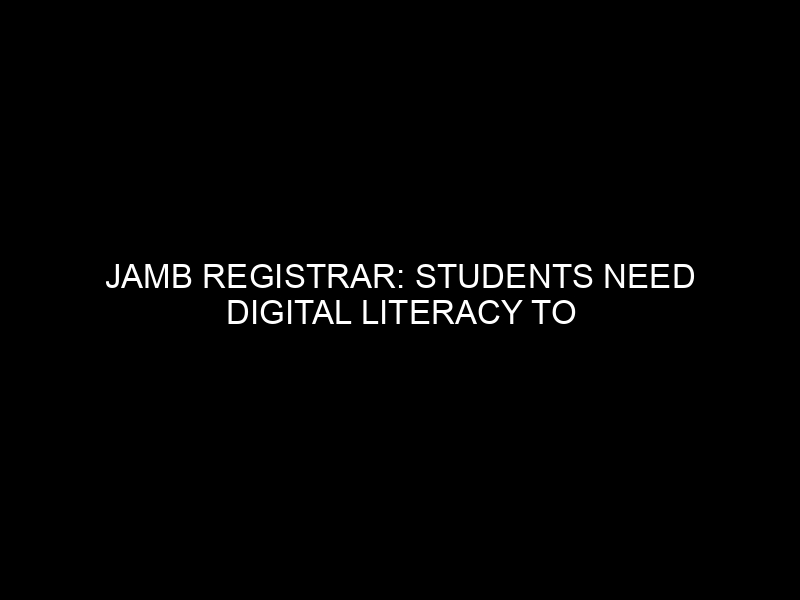In the evolving landscape of education, digital literacy has emerged as a critical skill for students worldwide. As the JAMB Registrar recently highlighted, the importance of digital literacy cannot be overstated in our increasingly digitalized world. This article, written from the perspective of a professional with a background in school education, aims to explore the nuances of digital literacy, its importance, and how it can be effectively integrated into the educational system to ensure student success.
The Critical Role of Digital Literacy in Student Success
Digital literacy extends beyond the basic ability to use digital devices. It encompasses a broad range of competencies including digital communication, online research, digital ethics, and understanding digital content. In today’s technology-driven society, these skills are not just advantageous but essential for students. The JAMB Registrar’s emphasis on digital literacy underscores a global shift in educational priorities, recognizing that these skills are fundamental in preparing students for higher education and the workforce.
Understanding Digital Literacy
To fully grasp the concept of digital literacy, it’s important to break it down into its core components:
- Digital Communication: The ability to communicate effectively through digital platforms such as email, social media, and collaborative tools.
- Online Research and Critical Thinking: Skills required to navigate the vast amount of information available online, discern credible sources, and use this information effectively.
- Digital Content Creation: The ability to create digital content, ranging from basic documents to more complex multimedia presentations.
- Digital Ethics and Safety: Understanding the ethical use of digital tools, including issues related to digital footprints, privacy, and cybersecurity.
The Impact of Digital Literacy on Education
Integrating digital literacy into education transforms traditional learning models. It encourages a more interactive and engaging learning environment, fostering critical thinking and problem-solving skills. Digital literacy also prepares students for online assessments, a method increasingly adopted by educational institutions, including those governed by bodies like JAMB.
Implementing Digital Literacy in Schools
Curriculum Integration
Schools play a pivotal role in embedding digital literacy into the curriculum. This can be achieved through:
- Incorporating Digital Tools in Teaching: Utilizing digital platforms and resources in everyday teaching.
- Project-Based Learning: Encouraging students to use digital tools in researching and presenting projects.
- Collaborative Learning: Promoting the use of digital collaboration tools to work on group projects.
Teacher Training
To effectively teach digital literacy, educators themselves need to be proficient in these skills. Professional development programs focusing on digital literacy are essential for teachers to stay abreast of technological advancements and pedagogical strategies.
Infrastructure and Access
Equitable access to digital tools and resources is crucial. Investments in infrastructure, such as high-speed internet and digital devices, are necessary to ensure that all students can benefit from digital literacy initiatives.
Challenges and Solutions
While the integration of digital literacy is critical, it is not without challenges. Issues such as digital divide, cyberbullying, and screen time concerns need to be addressed. Solutions include:
- Bridging the Digital Divide: Providing resources and support to students who lack access to digital tools.
- Cyber Safety Education: Incorporating cyber safety into the curriculum to teach students about responsible digital behavior.
- Balancing Screen Time: Encouraging a balanced approach to digital usage, blending traditional and digital learning methods.
FAQs on Digital Literacy in Education
Q1: Why is digital literacy important for students? Digital literacy equips students with the skills necessary to succeed in a digital world, enhancing learning, critical thinking, and problem-solving abilities.
Q2: How can schools integrate digital literacy into their curriculum? Schools can integrate digital literacy by incorporating digital tools in teaching, promoting project-based and collaborative learning, and providing professional development for teachers.
Q3: What are the challenges in implementing digital literacy in schools? Challenges include bridging the digital divide, ensuring cyber safety, and managing screen time effectively.
Conclusion
The emphasis by the JAMB Registrar on the necessity of digital literacy highlights its vital role in modern education. By integrating digital literacy into the curriculum, providing necessary infrastructure and training, and addressing associated challenges, educational institutions can ensure that students are well-equipped to thrive in a digital world. The future of education is unmistakably intertwined with digital literacy, making it an indispensable part of a student’s learning journey.\\

